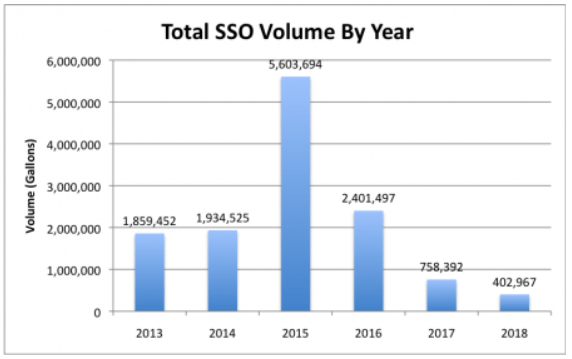2018 Sewer Spill Report
January 22, 2019
For six consecutive years, Congaree Riverkeeper has compiled and analyzed data from DHEC's sanitary sewer overflow (SSO) database
to produce an annual sewer spill report. In 2018, there were 229 reported sanitary sewer overflows resulting in just over 400,000 gallons of sewage spilled in Congaree Riverkeeper’s jurisdictional area. While this marks another significant reduction in the total SSO volume from previous years, there are some important caveats.
2018 Sewer Spill Summary
| Permittee | # of Spills | Volume of Spills (Gallons) | % of Total |
|---|---|---|---|
| Columbia, City of | 188 | 279,112* | 69.26% |
| Blue Granite Water Company (Carolina Water Service) | 12 | 41,380 | 10.27% |
| Richland County Utilities & Services | 5 | 28,700 | 7.12% |
| Winnsboro, Town of | 3 | 22,500 | 5.58% |
| Devro, Inc. | 1 | 9,000 | 2.23% |
| West Columbia, City of | 3 | 8,900 | 2.21% |
| Palmetto Wastewater Reclamation, LLC (Ni Pacolet Miliken/Apline/Woodlands) | 8 | 5,430 | 1.35% |
| Cayce, City of | 1 | 4,500 | 1.12% |
| American State Utility (Fort Jackson( | 4 | 2,470 | 0.61% |
| Easy Richland County Public Service... | 1 | 575 | 014% |
| Lexington, Town of | 2 | 200 | 0.05% |
| Serenity Apartments at Columbia, LLC (aka Riverbend Apartments) | 1 | 200 | 0.05% |
| Total | 229 | 402,967 | 100% |
*While the above numbers depict an overall improvement in the reduction of sewer spills, especially as it relates to the City of Columbia, the data, alone, does not provide a full snapshot of the impact of sewer spills in the Midlands area. For example, in November, an incident occurred at the City of Columbia's wastewater treatment plant that resulted in the “unanticipated bypass” of an approximately 2.25 million gallons of partially treated sewage.
The bypass, caused by a combination of factors including high water and equipment failure, was not reported as a Sanitary Sewer Overflow (SSO), because the sewage had already entered the treatment plant and gone through the first stage of treatment. Despite the event not being labelled an "SSO," the bypass nonetheless resulted in significant discharge of sewage into the Congaree River. Congaree Riverkeeper met with City of Columbia wastewater staff at the treatment plant in early December to discuss the incident and what actions the City is taking to prevent spills of this nature in the future.
Additional, Important Notes
- The table above only represents the reported sanitary sewer overflows within the Congaree Riverkeeper jurisdictional area. Several sewer providers in the Midlands, including the Town of Chapin, Richland County Utilities, and Blue Granite Water Company/Carolina Water Service also had spills that impacted other waterbodies, like Lake Murray. This includes a 28,800-gallon spill from Blue Granite Water Company/Carolina Water Service’s Watergate Plant into the lake in December.
- Most sewer providers are only required to report spills that are over 500 gallons or that impact a waterbody. The City of Columbia is required by its consent decree to report all of its spills, no matter the volume or impacted area.
- This report only shows sewer overflows that were reported to DHEC. Some sewer providers and satellite sewer systems fail to officially report their spills, like the December spill at the Riverbend Apartments that Congaree Riverkeeper documented and reported (see video below).
Top Ten Reported Sewer Spills
| Observed Date | Permitee | Failure Location | Failure Cause | Release Volume | Waterbody |
|---|---|---|---|---|---|
| 10/11/18 | Columbia, City of | 1547 Kathwood Dr. Columbia SC 29206 | Wet Weather | 56,400 | Lake Katherine and Gills Creek |
| 11/12/18 | Columbia, City of | 1548 Kathwood Dr | Wet Weather | 40,625 | Lake Catherine (Gills Creek) |
| 2/4/18 | Columbia, City of | 4835 Portobello Ct. Columbia SC 29205 | 3rd Part Responsible | 30,150 | Penn Branch to Lake |
| 3/22/18 | Richland County Utilities & Services | 1044 Eleazar Rd. Irmo, SC | Contractor broke 2" force main service line | 25,000 | |
| 12/12/18 | Columbia, City of | 1013 Rockyknoll Dr. Columbia, SC 29203 | Roots | 16,839 | Trib to Crane Creek |
| 3/9/18 | Winnsboro, Town of | Northeast Of Evans Knoll Development About 200 ft. from Moultrie St. | Root build up in mainline | 16,000 | Sewer main right of way alongside Jackson Creek, northeast of Evans Knoll |
| 10/11/18 | Blue Granite Water Company | 131 Greenbriar Dr. Friarsgate WWTP Chlorine Contact Chamber | Approximately 5 inches of rain from tropical storm Michael with flooding creeks over topped manholes in the collection system | 15,000 | Creek behind the property of Friarsgate WWTP, partially treated effluent |
| 11/12/18 | Columbia, City of | 4545 Pine Grove Ct. | Wet Weather | 15,000 | Lake Katherine (Gills Creek) |
| 12/9/18 | Columbia, City of | 1011 Darling St. Columbia, SC 29201 | Collapsed Line | 10,500 | Storm Drain |
| 9/17/18 | Devro, Inc. | 871 Old Swamp Road Swansea SC 29160 | At approximately 22:30, an electrical storm shortened out pumps in lift station and lalarms. The storm caused 1.3 inches of rainfall and dangerous lightning, causing the power outages at lift station. | 9,000 | Congaree River |
SSO Hotspots
Lake Catherine / Gills Creek
Lake Katherine, in the Gills Creek watershed, is the number one SSO hotspot with spills regularly occurring whenever the Midlands receives any significant amount of rainfall. The City of Columbia is working on a sewer project that it hopes will resolve the SSO issues. The project should be completed in the next year.
Rawls Creek
Blue Granite Water Company/Carolina Water Service had several SSOs from its Friarsgate system that impacted Rawls Creek, a tributary to the Lower Saluda River that runs through Saluda Shoals Park. While the discharge from the Friarsgate wastewater plant into the Saluda River is scheduled to be eliminated this spring, it is clear that the company still has significant work to do on its collection system.
Top SSO Volumes From Around the State
| Permittee | Total 2018 Spill Volume | # of Spills |
|---|---|---|
| Dorchester County | 3,070,400 | 7 |
| Hollywood, Town of | 2,442,000 | 3 |
| North Charleston Sewer District | 1,569,375 | 11 |
| Renewable Water Resources (REWA) | 806,983 | 33 |
| Chesterfield, Town of | 620,250 | 9 |
| Rock Hill, City of | 341,800 | 5 |
| Newberry County Water & Sewer Authority | 320,000 | 2 |
| Columbia, City of | 279,112 | 188 |
| Berkeley County Water & Sanitation Authority | 203,950 | 8 |
| McCormick County Water Sewer Authority | 190,600 | 13 |
| Greenville, City of | 173,480 | 9 |
| Grand Stran Water & Sewer Authority | 110,201 | 48 |
| Charleston Water System | 97,105 | 23 |
| Lamar, Town of | 90,000 | 1 |
| Swansea, Town of | 88,542 | 1 |

